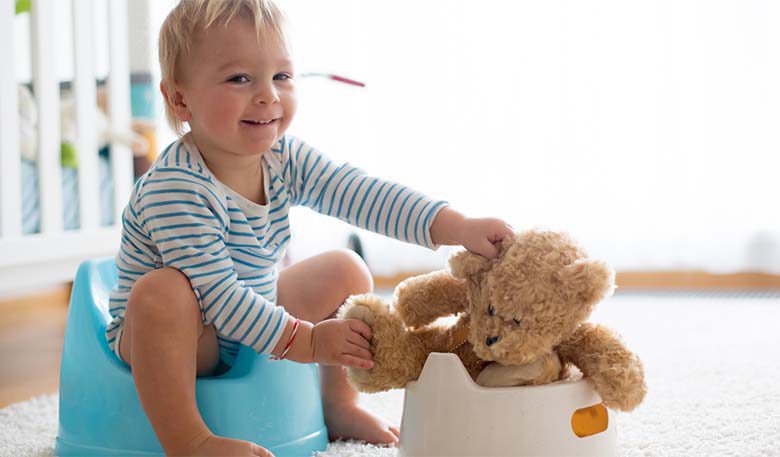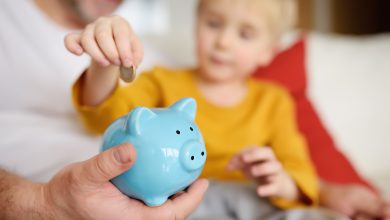Potty Training 101

Potty Training 101
It’s a new year! A new you! A new take on life!
While most people are busy making resolutions for themselves, parents are often making resolutions for other people. Namely, their children. And at the top of that “I’m gonna get it done this year” list for many are two words in all caps: POTTY TRAINING.
And most kids respond to this goal in the same way …
So, before you tussle with your toddler over toilet training, here are some tips of the trade to traverse this potentially troublesome topic 😉
When to Start
The biggest question for many parents is simply when to start potty training. And while you may not want to hear this, it really comes down to one person’s timeline: your child’s.
The American Academy of Pediatrics (they’re kind of a big deal …) say that toilet training “should always be based on the child’s developmental level rather than on the child’s age.” They emphasize that trying to start potty training before the child is developmentally ready “can create stress and anxiety for the child and the family, and increase the length of time it takes to train the child.”
In short, we as parents need to take a Taylor Swift line to heart and calm down.
According to The Mayo Clinic, kids can start showing interest in potty training as early as 18 months, but others might not be ready until they’re 3 years old. More important than age, though, are the developmental milestones your kid needs to reach before they are ready to potty train. Make sure they:
- Can walk to and sit on a toilet.
- Can pull down their pants and pull them up again.
- Can stay dry for up to two hours.
- Can understand and follow basic directions.
- Can communicate when they need to go.
- Seem interested in using the toilet or wearing “big-kid” underwear.
If your kiddo isn’t there yet, don’t fret. If you start potty training before your child is ready, it can make the whole thing take longer. And maybe you’ve already noticed how stubborn toddlers can be?
Yeah, we figured.
Are You Ready?
For your child to successfully navigate potty training, they’ll need your A game. That being said, life may not give you that luxury. Here are some reasons why you may decide it’s best not to try and potty train your child right now:
- You’re about to have another child. (We know … it would be REALLY nice to only have one kid in diapers, but the chaos of a new baby could make it hard for potty training to stick.)
- You’re traveling.
- You’re about to move.
- Your child is switching from a crib to a bed.
- Your child is sick, especially if diarrhea is involved.
- Your family is going through turmoil, like a serious illness or death.
Tips for Parents
Even though your child is doing the work of learning how to go to the bathroom, you are a part of this, too. Keep these things in mind as you help your kids achieve this major milestone:
- Be positive! When you go to the bathroom, use it as a chance to talk your child through the process. Make the bathroom a fun place your child wants to sit, with or without the diaper on. Let them sit on the potty seat just for fun without any expectations that they will actually use it.
- Look for the signs. How does your kid act when they need to pee or poop? Do they do a little dance? Get red in the face? Hide in a corner? Whatever it may be, when you spot it, get them to the potty quickly and calmly.
- Accidents happen. This is 100% not going to be 100% successful. Don’t scold, discipline or shame your child if they don’t make it to the toilet in time (or at all). Stay supportive and positive. Keep a change of underwear and clothing handy wherever you go.
Tips for Every Kid
Regardless of their gender, here are some things to keep in mind when you’re potty training your toddler.
- Use a footstool for balance. Think about how weird and unsettling it would feel to try and use the toilet while your feet dangled in front of you. Give your kids a footstool they can put their feet on so they don’t feel like they are going to fall off the seat. Even for adults, being in a more squatted position can help a person pass stool without straining.
- Flush and lower. Have your kiddos flush the toilet and lower the toilet seat every time they use the bathroom.
- Don’t fight with clothes. The amount of time between your child realizing they have to go and it happening can be very short. Don’t set them up for failure by dressing them in clothing with a thousand clasps, buttons, and zippers. Use pants with an elastic band for easy up-and-down movement.
- Schedule potty breaks. In the beginning, your kiddo won’t remember to run to the bathroom every time the urge hits. Help them out by taking them to the bathroom two hours after they last went. Even if they just sit there, praise them for trying.
- Don the “big kid” pants. After a couple of weeks of staying dry during the day, trust your child with training pants or underwear. Some kids may need to go back to diapers for a bit, and that’s okay!
- Celebrate! Being potty trained is a big deal for everyone. Use a sticker chart or small rewards for positive reinforcement.
- Nights and naps. Sleeping through the night and naps without an accident takes A LOT longer to master. Most children can’t stay dry at night until they’re between the ages of 5 and 7. Keep them in diapers or training paints until then and don’t fret if they go into elementary school and still can’t make it through the night without wetting the bed.
Potty Training for Girls
If you’re helping your daughter potty train …
- Learn to wipe well. Wiping front to back is crucial in keeping bacteria out of sensitive places for girls. If this part is hard for her to understand or is tricky to accomplish, have her pat dry instead as you work together on getting this process down.
- Hike it up. In addition to all those buttons and clasps we’re trying to avoid, girls may need to hike a dress or skirt up to use the toilet. Just like with pants, try to choose clothing that sets them up for success.
Potty Training for Boys
Here are some tips to consider when potty training your son:
- Start with sitting. Standing while peeing means your toddler needs to have good aim and, let’s be honest, even adult men seem to have problems in that department. Set up your little boy for success by starting seated. Plus, what starts out as just #1 can quickly turn into #2. If your son is sitting down, there’s nothing to worry about.
- Don’t forget to aim. I know, we just talked about aim, but even if your son is sitting, he’ll still need to be taught to point his private part down. Otherwise, you’ll be cleaning up the bathroom floor even though you made it to the toilet in time.
Something to note with boys. Statistically, boys take about 6 months longer than girls to start potty training. There could be several reasons why: it’s usually Mom (not Dad) coaching them and the difference in biology can be a little confusing, boys have to master both sitting and standing, and they’re typically more active and don’t like to stop all the fun they are having to go use the bathroom.
You’ve Got This
If your child goes to Little Sunshine’s Preschool, they do not have to be potty trained before they start. (Whew, right?) Our kids span the ages of 6 weeks old to 6 years old, so we are with them during every phase of their potty training years. The only requirement that most Little Sunshine’s Preschool locations have is for children to be potty trained before they can move up to the Pre-K class at age 4. When your kid is ready to use the potty, our teachers and leadership will partner with you and your child to make it a positive, constructive experience.
It may seem like the whole process is doomed to fail, but we promise it will happen. Just remember … every child is different in how long it takes to potty train, but every child eventually gets there. Just love them through it, and everything will be just fine. You’ve got this!





